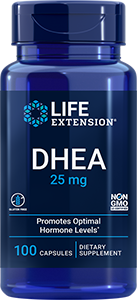
What are DHEA Supplements? A Beginner’s Guide
Published: June 2022
We all have at least one thing in common: We're aging every day. And with that comes certain changes. Maybe your eyes and your memory aren't as sharp, and some of the—*ahem*—spark is gone from your romantic relationships. Are we all merely a victim of Father Time, or is there something you can do about it?
Enter: DHEA for longevity. Let's talk about what it is, what benefits it can offer, and if it might be a good supplement for you.
DHEA supplements: What are they?
Dehydroepiandrosterone, or DHEA, is a hormone. Along with dehydroepiandrosterone's sulfated form—DHEA sulfate (dehydroepiandrosterone sulfate)—it's the most abundant steroid hormone in the body. It's also a precursor to two other hormones you're likely familiar with: estrogen and testosterone, the sex hormones. All the hormones combined control many of your body's very important functions and systems.
Dehydroepiandrosterone supplements come from wild yams. Often, a supplement will provide 15 mg of DHEA, 25 mg of DHEA, or 50 mg of DHEA per serving. These supplements are used to keep your hormone levels youthful as you age—although that's not dehydroepiandrosterone's only application.
Where is DHEA found: natural or synthetic?
Your body is already producing dehydroepiandrosterone in your adrenal glands. Men also produce more in their testes and women in their ovaries. Plus, science tells us that your brain makes DHEA as well.
While wild yams as a source of dehydroepiandrosterone are natural, the specific processes to create the supplements themselves take place in scientific laboratories. Special techniques are used to confirm that the molecules in the supplement are identical to the DHEA that your body is already producing.
How do DHEA supplements work?
As we age, our hormone levels can decrease. This happens with estrogen, testosterone, and—you guessed it—dehydroepiandrosterone. Fortunately, you can use DHEA supplementation to counter any age-related decreases in the hormone. This is especially important considering that dehydroepiandrosterone is the most abundant steroid hormone in the body. So, maintaining appropriate levels is important for your overall health. Furthermore, some of your DHEA converts to estrogen and testosterone. So, there's some overlap between the three hormones.
Women may read this and think, "Well, I don't want to supplement with DHEA, then!" And we hear you. After all, as an androgen, testosterone helps to maintain male characteristics. But even though the ladies produce a lot less testosterone than men, you still need some. In particular, testosterone is important for maintaining a healthy libido. Plus, it plays a role in bone and brain health. So, women do need testosterone, and thus, dehydroepiandrosterone can help you.
For the gentlemen, you might want to consider other foundational supplements in addition to dehydroepiandrosterone. This can better support your health and well-being.
DHEA supplements: 11 health benefits
Many double-blind, placebo-controlled trials have looked more closely at the benefits that dehydroepiandrosterone supplementation can offer the human body. This is important especially since declining DHEA levels as we age can play a part in age-related physical changes. Thus, older men and postmenopausal women stand to benefit greatly by adding dehydroepiandrosterone to their routines.
Much of the research around dehydroepiandrosterone supplementation has focused on how it can help us stay more youthful as we age. This is what we've learned from science so far.
So how exactly does DHEA fight back against the ravages of time? Let us count the ways!
Good to the bones.
For postmenopausal women, loss of bone mineral density is common. Supplementing with dehydroepiandrosterone can help keep your bones strong, even as you age.A muscle strength must-have.
No, DHEA can't make up for skipping the gym, but this dietary supplement can support those "gains" when coupled with weight training.Better body composition.
It's not just muscle strength that matters when it comes to keeping a youthful body as you age. It also matters that you're not losing muscle mass to fat. Dehydroepiandrosterone helps you increase muscle mass and can even help you reduce body fat. Including 7-keto-DHEA may also help you gain the upper hand if you are trying to improve body composition. (But again, not without getting in those workouts, at the gym or at home!)Sex hormone support.
One of the worst parts about aging is loss of interest in sex—and with that, lack of physical intimacy (and the many benefits that come with that, such as the release of the "love" hormone oxytocin). DHEA to the rescue! This supplement supports both healthy libido and sexual function for both sexes.Big brain health benefits.
Worried about those "senior moments"? Consider supplementing with DHEA to support healthy, youthful cognitive function. (Interesting sidenote: DHEA isn't the only hormone that can be taken as a dietary supplement to support your noggin! Pregnenolone is a precursor to DHEA and is often also used as a supplement to support brain health and function.)Promotes a healthy inflammatory response.
Supporting a healthy inflammatory response is a key component of supporting your overall health and well-being.Youthful skin.
The appearance of wrinkles and fine lines are as much a part of aging as bone density changes and decreases in libido, but that doesn't make them fun! While you'll still want to use anti-aging skincare products to keep your skin young-looking, fortunately, DHEA supplements can also support your skin's moisture content, quality, and tone.Healthy arteries.
You probably think of CoQ10 or magnesium when you think of the traditional "heart health" supplements, but did you know that DHEA supports arterial health? Of course, as is the case with everything else, supplementation is just one way to help keep your cardiovascular system healthy.Healthy glucose metabolism.
Similarly to heart health, DHEA isn't a top-of-mind supplement when it comes to healthy glucose metabolism . But it turns out that supporting already-healthy blood sugar is yet another benefit of this standout anti-aging supplement.Keep that metabolism revved.
As we age, it's inevitable that we won't have the same metabolism we had when we were in our 20s, 30s, or even 40s or 50s. But you can find ways to support a youthful metabolism—and fortunately, DHEA has metabolic health benefits.A sunny disposition.
DHEA also supports a healthy mood in mid-life...and who doesn't want that?
Who needs DHEA supplements?
After the age of 25, you might consider testing your dehydroepiandrosterone levels because levels may start declining at this point. Follow your DHEA levels yearly, and when you see a big drop off, that's when DHEA supplements can be your anti-aging ally.
A DHEA blood test will look at how much your body is producing, and typically will be tested alongside sex hormones like estrogen, testosterone, and progesterone. Urine hormone testing for dehydroepiandrosterone is also an option, although the results are less validated than blood testing.
Not sure if DHEA supplementation is right for you? Take our hormone health quiz!
Explore Our Best DHEA Supplements
DHEA supplements have side effects?
Dehydroepiandrosterone is a naturally occurring hormone (just like estrogen and testosterone). However, you should only supplement with it under the guidance of a healthcare provider. Research suggests that you can safely consume up to 50 mg for a year or more. If side effects do occur, they commonly include skin changes, increased sweating or body odor, and changes in hair growth. Mood fluctuations can also happen as a side effect. However, under the right circumstances, DHEA is well tolerated.
Remember that if you supplement with DHEA, it can also increase your levels of estrogen and/or testosterone. That said, one study of age-advanced individuals found that DHEA supplementation didn't affect the prostate size or markers in men or lead to breast/cervical changes in women as side effects. However, if you are concerned (about side effects or dehydroepiandrosterone in general), speak with your healthcare provider first!
DHEA dosage recommendations
Most commonly, individuals who wish to supplement with DHEA start at 15 to 25 mg a day, with women typically opting for something lower than men. Be sure to have your DHEA levels tested about three to six weeks after you begin supplementing. Your DHEA dosage might be unique to you and your needs/goals.
What to look for in a DHEA supplement
Like many other supplements, dehydroepiandrosterone comes in different forms, including capsules and tablets that dissolve in your mouth. You can also opt for a vegetarian supplement. Consider starting with a lower dose and increasing it over time, if a blood test indicates that you need more.
When is the best time to take DHEA supplements?
It's ideal to take your DHEA supplement in the morning when the levels in the human body are naturally at their highest. If you supplement with it more than once a day, try doing it before breakfast and lunch.
Should DHEA supplements be taken with food?
Dehydroepiandrosterone is usually taken without food, although it's safe to consume with food if this helps you remember. What matters most is that you're consistent with your DHEA dosage.
How long do you have to take DHEA before it works?
The DHEA levels in your body will respond fairly rapidly to supplementation. This is especially the case with an improvement in libido. But the majority of DHEA benefits will take longer. Plan to supplement for at least two months before looking for any other significant changes.
We can't completely control what our bodies do as they age. But we can offer them extra support through the food and supplements we consume. Talk to your doctor and see if DHEA might be a good addition to your lifestyle.
References
- Baulieu, Etienne-Emile et al. "Dehydroepiandrosterone (DHEA), DHEA sulfate, and aging: Contribution of the DHEAge Study to a sociobiomedical issue." PNAS, April 2000, https://www.pnas.org/doi/abs/10.1073/pnas.97.8.4279
- Bloch, Miki et al. "The use of dehydroepiandrosterone in the treatment of hypoactive sexual desire disorder: A report of gender differences." European Neuropsychopharmacology, August 2013, https://www.sciencedirect.com/science/article/abs/pii/S0924977X12002684
- Decker, Carrie, ND. "The Anti-Aging Effects of DHEA." Naturopathic Doctor News & Review, https://ndnr.com/anti-aging/the-anti-aging-effects-of-dhea/
- Dhatariya, Ketan et al. "Effect of dehydroepiandrosterone replacement on insulin sensitivity and lipids in hypoadrenal women." Diabetes, March 2005, https://pubmed.ncbi.nlm.nih.gov/15734854/
- Genazzani, Alessandro d et al. "Might DHEA be considered a beneficial replacement therapy in the elderly?" Drugs Aging, 2007, https://pubmed.ncbi.nlm.nih.gov/17362047/
- Hackbert, Lucianne et al. "Acute Dehydroepiandrosterone (DHEA) Effects on Sexual Arousal in Postmenopausal Women." Journal of Women's Health & Gender Based Medicine, July 2004, https://www.liebertpub.com/doi/abs/10.1089/152460902753645290
- Heaney, Jennifer L J et al. "Ageing, physical function, and the diurnal rhythms of cortisol and dehydroepiandrosterone." Psychoneuroendocrinology, March 2012, https://pubmed.ncbi.nlm.nih.gov/21802858/
- Hyman, Jordana H. et al. "DHEA supplementation may improve IVF outcome in poor responders: a proposed mechanism." European Journal of Obstetrics & Gynecology and Reproductive Biology, May 2013, https://www.sciencedirect.com/science/article/abs/pii/S0301211512005817
- Jankowski, Catherine M. et al. "Effects of Dehydroepiandrosterone Replacement Therapy on Bone Mineral Density in Older Adults: A Randomized, Controlled Trial." JCEM, August 2006, https://academic.oup.com/jcem/article/91/8/2986/2656474
- Maayan, Rachel et al. "The effect of DHEA complementary treatment on heroin addicts participating in a rehabilitation program: A preliminary study." European Neuropsychopharmacology, June 2008, https://www.sciencedirect.com/science/article/abs/pii/S0924977X07002489
- Ohlsson, Claes et al. "Serum DHEA and Its Sulfate Are Associated With Incident Fall Risk in Older Men: The MrOS Sweden Study." JBMR, March 2018, https://asbmr.onlinelibrary.wiley.com/doi/full/10.1002/jbmr.3418
- Papierska, L et al. "Effect of DHEA supplementation on serum IGF-1, osteocalcin, and bone mineral density in postmenopausal, glucocorticoid-treated women." Advances in Medical Sciences, June 2012, https://www.sciencedirect.com/science/article/abs/pii/S1896112614601085
- Reiter, Werner J et al. "Dehydroepiandrosterone in the treatment of erectile dysfunction: a prospective, double-blind, randomized, placebo-controlled study." Urology, March 1999, https://www.sciencedirect.com/science/article/abs/pii/S0090429598005718
- Rosenthal, Amanda BA et al. "The role of bioidentical hormone replacement therapy in anti-aging medicine: a review of the literature." International Journal of Dermatology, October 2019, https://onlinelibrary.wiley.com/doi/abs/10.1111/ijd.14684
- Schmidt, Peter J. et al. "Dehydroepiandrosterone Monotherapy in Midlife-Onset Major and Minor Depression." JAMA Psychiatry, 2005, https://jamanetwork.com/journals/jamapsychiatry/article-abstract/208294
- Strac, Dubravka S et al. "Dehydroepiandrosterone (DHEA) and its Sulphate (DHEAS) in Alzheimer's Disease." Current Alzheimer Research, 2020, https://www.ingentaconnect.com/content/ben/car/2020/00000017/00000002/art00004
- Tang, Justine et al. "The Utilization of Dehydroepiandrosterone as a Sexual Hormone Precursor in Premenopausal and Postmenopausal Women: An Overview." Pharmaceuticals (Basel), December 2021, https://www.ncbi.nlm.nih.gov/pmc/articles/PMC3156603/
- van Lunsen, Rik H. W. et al. "Maintaining physiologic testosterone levels during combined oral contraceptives by adding dehydroepiandrosterone: II. Effects on sexual function. A phase II randomized, double-blind, placebo-controlled study." Contraception, July 2018, https://www.sciencedirect.com/science/article/pii/S0010782418300763
- Villareal, Dennis T. et al. "DHEA enhances effects of weight training on muscle mass and strength in elderly women and men." American Journal of Physiology, November 2006, https://journals.physiology.org/doi/full/10.1152/ajpendo.00100.2006
- Villareal, Dennis T. et al. "Effect of DHEA on Abdominal Fat and Insulin Action in Elderly Women and Men." JAMA, 2004, https://jamanetwork.com/journals/jama/article-abstract/199765
- Weiss, Edward P. et al. "Dehydroepiandrosterone (DHEA) replacement decreases insulin resistance and lowers inflammatory cytokines in aging humans." Aging, May 2011, https://www.ncbi.nlm.nih.gov/pmc/articles/PMC3156603/
- Weiss, Edward P. et al. "Dehydroepiandrosterone replacement therapy in older adults improves indices of arterial stiffness." Aging Cell, June 2012, https://onlinelibrary.wiley.com/doi/full/10.1111/j.1474-9726.2012.00852.x
- Wolkowitz, Owen M., M.D. wt al. "Double-Blind Treatment of Major Depression With Dehydroepiandrosterone." The American Journal of Psychiatry, https://ajp.psychiatryonline.org/doi/full/10.1176/ajp.156.4.646
- Yamada, Shizuru et al. "Maintaining physiologic testosterone levels during combined oral contraceptives by adding dehydroepiandrosterone: II. Effects on sexual function. A phase II randomized, double-blind, placebo-controlled study." Geriatrics Gerontology International, May 2010, https://onlinelibrary.wiley.com/doi/abs/10.1111/j.1447-0594.2010.00625.x
- Yanagita, Ikumi et al. "A High Serum Cortisol/DHEA-S Ratio Is a Risk Factor for Sarcopenia in Elderly Diabetic Patients." Journal of the Endocrine Society, April 2019, https://academic.oup.com/jes/article/3/4/801/5368377







